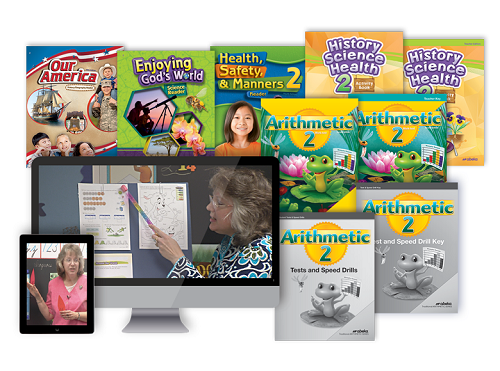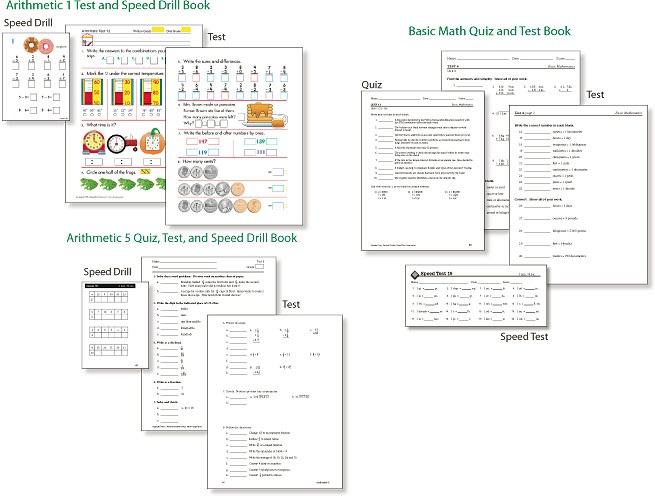Abeka Academy
Abeka can be done with or without internet
Abeka Academy is run by the Pensacola Christian Academy in conjunction with Pensacola Christian College in Pensacola Florida. They are one of the most well-known academies in the world and have huge numbers of homeschoolers enrolled in their academy.
The academy is accredited, and they keep transcripts and issue a high school diploma if a student completes high school with their academy. They hold a high school graduation each year for the senior graduating class in Pensacola, Florida.
Students enrolled in the Abeka Academy have a choice of whether they want to complete their lessons watching DVD’s or online. The DVD option allows students who are not online to complete the material without an internet connection. The DVD option comes with a DVD for each day. DVD’s must be returned at the end of the year, and if they are not, parents are charged an extra $400. The online option has the exact same content, except that it is online.
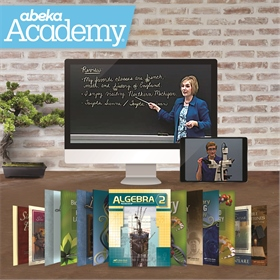
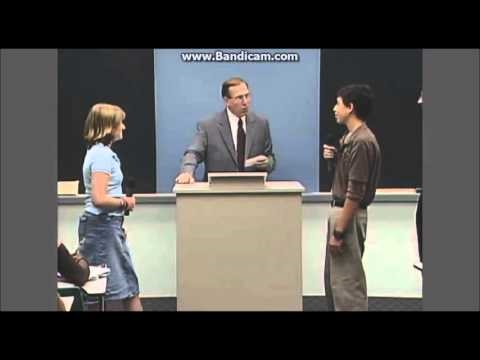
Students watch a real class at a live academy
Abeka is run by an actual physical academy, which is a classical private school. Classes in the school are recorded, and homeschool students watch those taped classes, so the homeschooled student is doing the exact same material as the students in the physical Pensacola Christian Academy.
Homeschooled students will see the teacher and the class in the video. Teachers write on the board daily, and homeschoolers can clearly see what is written. Teachers address the homeschooled students during every class and often ask them to take a turn answering questions with the rest of the class, though the teacher and class cannot actually hear the homeschooled child.
Parents and Abeka work together to teach
Prior to the start of school each year, students receive a very large box of books, workbooks, tests and quizzes, and teacher’s manuals. In addition, parents receive a day-by-day manual of what the student is to do for the day and what the responsibilities of the parent teacher entail for that day. It also has forms to fill in grades for each assignment.
It is worth stating that Abeka’s teachers are exceptional. They are often funny and do an excellent job of explaining the curriculum. Homeschoolers that we have seen in this program have often felt a connection to the teacher and various students in the class. Although students cannot talk to instructors live, they can write to the actual teacher on the video, and they do receive that mail. If students have questions about their schoolwork or the lessons, they can call in and speak to a teacher as many times as they would like. The teacher that they will be speaking with will not be the one that is giving the instruction on the video, however.
Abeka requires that the parents be very active in homeschooling their child. The parent must present the student with the worksheets and other assignments for the day and grade all assignments. They must also go over assignments and homework with the child. At the end of each quarter, parents will need to send in all grades and tests.
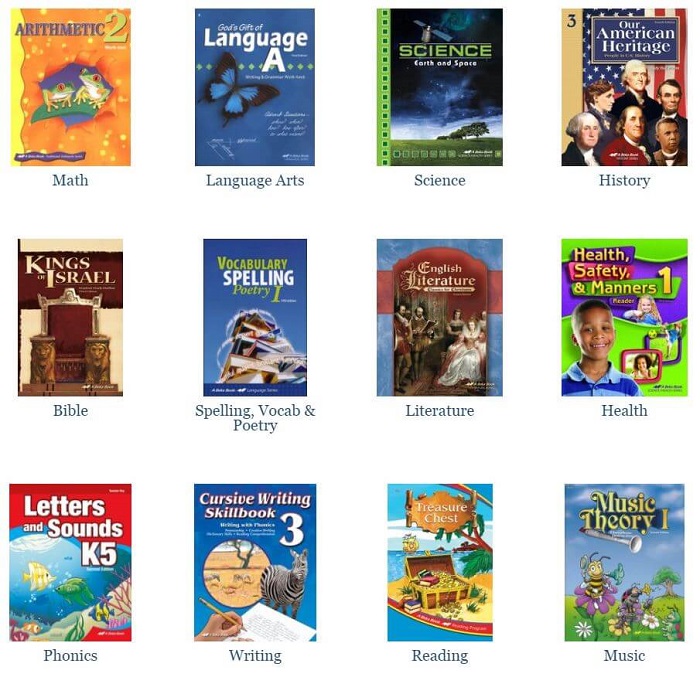
Teaching style is classical and advanced
The instruction style of Abeka is “Classical”. What that means is that in elementary school they go over material repeatedly to lay a strong foundation. There is a lot of memorizations, and students learn through language and the spoken word. What students observe in the classroom is like the sterotypical private school. Everything is orderly, and students are required to be polite and respectful.
Abeka is an advanced curriculum, and if parents and students follow everything exactly as required, the educational value of the program is outstanding.
Every child is different, and just because a particular curriculum works well for one child, doesn’t necessarily mean it will work for another. However, with regard to our personal testing of Abeka, we have one student that we followed that utilized Abeka Academy from the fourth grade on, completing everything as stated by the academy. This student scored well above average on both the PSAT and the SAT and went on to a 4.0 in college. She accredits the education that she received in Abeka with laying a strong foundation with all of the major subjects, and in addition, she cites Abeka as having instilled in her strong study and memorization habits due to the structure of Abeka’s curriculum and the amount of work necessary to complete Abeka. We also have an additional child which we followed, which utilized Abeka from kindergarten. She is now in middle school and is ADHD. She struggled somewhat with sitting still and learning from watching and listening to a teacher, as opposed to as much “hands-on” work. However, surprisingly, she has scored very well academically on testing for her age, which would indicate that she did learn a great deal from the curriculum. She was placed in a more “hands-on” curriculum with Liberty Academy to test to see if she would do better with that style of teaching. She did. However, the child still preferred Abeka over Liberty because she enjoyed seeing the other children in the class, stating that she learned from their answers and mistakes as much as she learned from the teacher, and she and had become accustomed to watching a teacher in front of the class.
With that said, Abeka is not for the “faint of heart”. If everything is followed as stated, it gives the student a great deal of work daily. In our research, the high school students we followed needed at least seven hours or more per day to complete Abeka, with “or more” being pretty consistent.
However, it should be noted that students can have access to the exact same material in the DVD or online format. The only difference between that option and the academy is that with the academy, students have to complete everything, and parents have to send in work. Then, the academy issues a report card and keeps transcripts. With the DVD or online options, parents decide what assignments are completed and issue grades.
170 days, 10 field trips, yet flexible
Students must complete 170 days of instruction and 10 days of field trips per year. Since there is so much work involved in the 170 days, it is hard to add in other subjects or projects, and because students would fall behind if they skipped a lesson, parents cannot simply decide to substitute something else for a day’s lesson. Therefore, anything extra adds extra days on to the child’s homeschool.
There is some flexibility. Students can start any time in the year, and they have a full year to complete the 170 days of work. As far as Abeka is concerned, students can work ahead and can do more than one lesson per day or work six days a week instead of five to get out early. Additionally, this is a curriculum that has no time schedule, so it can be completed any time of the day.

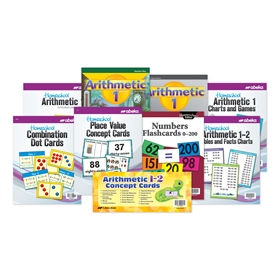
Students must be schooling full time
It is important that students do not get behind with Abeka, as they will have a very difficult time catching up.
All of a student’s work must be turned in quarterly by a specified date. If it is not, Abeka charges the parents a fee for late work. Students not turning in work within 12 months will fail.
Students must have satisfactory grades through the third quarter before they can enroll in the following year’s grade level. This is important to know if students are doing a flex schedule through the summer because it takes several weeks to receive the package of books that are needed at the start of school.
Parents new to Abeka are advised to take some time to read the manual and all accompanying curriculum instructions and teacher’s manuals. Abeka can be very confusing for home teachers until they learn how it all works. This is because some instructions are found in the manual, while others may be on the grading form, or in the teacher’s manuals. Additionally, parents need to put in place some system for making sure students receive the right worksheets on the right day.
Electives somewhat lacking
Abeka offers students the opportunity to study stringed instruments thorough their “Jaffy Strings” curriculum, which can be taken for a number of years.
They also have a number of other electives, however one of the drawbacks of Abeka is its short list of electives. Elementary students do not have electives, and Abeka’s electives are satisfactory for middle school. However, high school electives are lacking compared to some other academies. Abeka includes the cost of the number of electives stated for the corresponding grade level in their tuition, and they do allow students to buy additional electives.
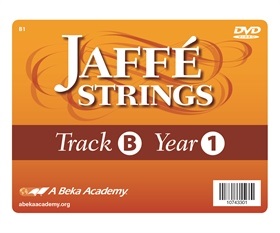
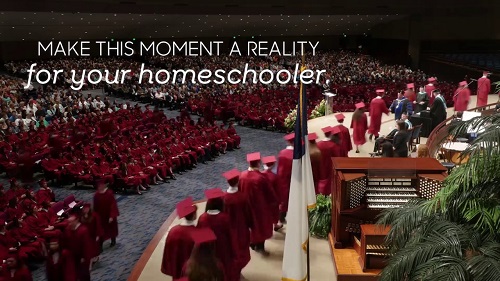
Tuition is one of the lowest for an academy
Abeka allows dual enrollment for high school students in Pensacola Christian College. The cost runs about $175 credit hour, with classes being limited to GER classes. However, parents should be aware that Pensacola Christian College is not accredited, therefore credits obtained at that college do not transfer to other colleges.
The tuition to Abeka is extremely reasonable. The cost is between $959.00 per year and $1219.00 per year, depending upon what grade the student is in, and parents can opt to pay per month instead of all at once.
Abeka does keep transcripts, and if students graduate from their academy, they are invited to Pensacola, Florida the year they graduate for high school graduation.
Our review - 5 out of 5 stars with notation
Abeka received outstanding scores on all of our research testing with students enrolled in the academy. The only negative that we found was that one student had an issue with them refusing to send transcripts to a rival academy when the student wanted to transfer, which has been confirmed. For this reason, we would suggest that parents request that the school send them a “non-official” transcript prior to letting Abeka know if there are plans to transfer a student, as most rival academies will take the unofficial version.
Abeka is highly recommended for students that learn well watching and hearing a teacher in front of the class. And, it is recommended for parents that do not want to do all of the teaching but who are still willing to assist students when they need it, and who have the time to grade work and send in work requested.
Outcomes that we saw from students taking the curriculum throughout elementary and middle school were excellent, but it should be noted that those students followed the full curriculum. Students not doing all assignments may not have as good of a result. Abeka has a lot of work to its curriculum, and students need to plan on at least 8 hours per day or more to complete this curriculum if it is done correctly.
High school also offers a sound academic education. However, we did find a couple negatives with high school. With Abeka, students do not have live classes. They watch video recordings. There is a teacher to answer questions, but students have to call in at certain times. Some students, we found, would not call in for help even though they struggled. Many of the other academies we reviewed have live teachers that initiate asking students if they need help.
The other issue is Abeka’s high school electives are lacking compared to other academies. Some of them do not come with a teacher, just a book. And the list of electives is very short. Of course, parents could add classes from another source, but students are still required to complete the Abeka electives as well to obtain credit from Abeka.
Many of the other academies, particularly the ones with live classes, do not admit students until they reach at least eighth grade. We see some families using Abeka up until that point, and then switching to live academies from eighth grade thru twelfth.
Overall, we highly recommend Abeka Academy. It gets 5 out of 5 stars, with the notation that Abeka does require more work from the parents than many of the other academies, but it is also less expensive.
Abeka Academy’s Website can be found at: www.abeka.com/Homeschool/Products/AbekaAcademy/
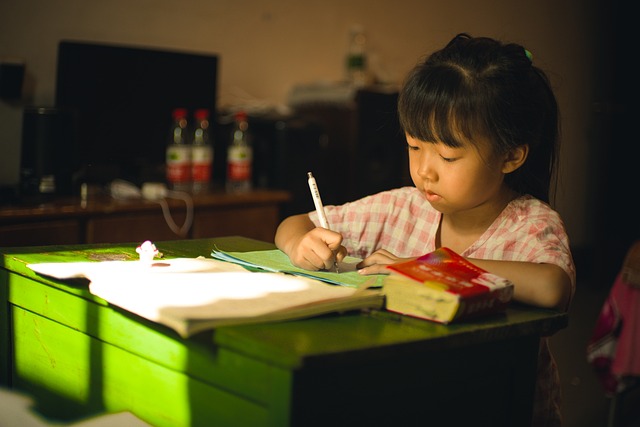
Follow the links to the right for full reviews of each academy
Abeka Academy
Excelsior Classes
HSLDA Academy
Liberty University Academy
Sevenstar
Florida Virtual
Alpha & Omega
